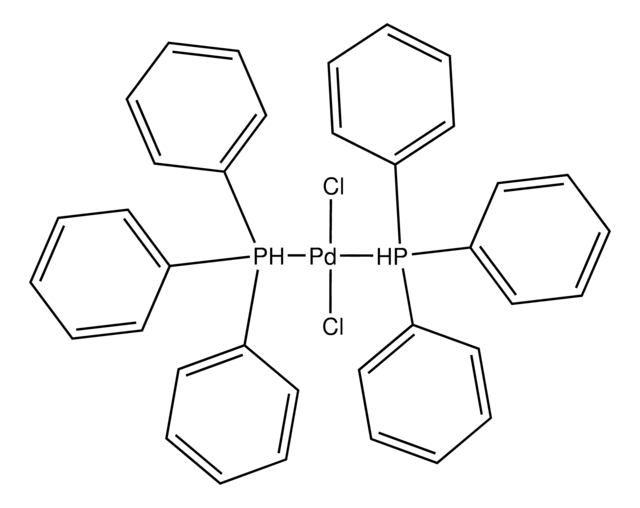03140
Copper(I) iodide
purum, ≥99.5%
Synonym(s):
Cuprous iodide
About This Item
Recommended Products
vapor pressure
10 mmHg ( 656 °C)
Quality Level
grade
purum
Assay
≥99.5%
reaction suitability
core: copper
reagent type: catalyst
mp
605 °C (lit.)
density
5.62 g/mL at 25 °C (lit.)
anion traces
sulfate (SO42-): ≤5000 mg/kg
cation traces
Fe: ≤50 mg/kg
SMILES string
[Cu+].[I-]
InChI
1S/Cu.HI/h;1H/q+1;/p-1
InChI key
LSXDOTMGLUJQCM-UHFFFAOYSA-M
Looking for similar products? Visit Product Comparison Guide
Application
nonactivated aryl iodides in hexamethylphosphoric triamide to form aryl sulfides.
Copper(I) iodide can be used to catalyze:
- Thioetherification of aryl halides using thiourea and alkyl bromides in wet polyethylene glycol and in the presence of potassium carbonate as a base.
- Reaction between acetylenes and metal halides in diethylamine to form transition metal alkynyl complexes.
- Reaction between terminal alkynes with phenylchalcogenyl halides to form alkynyl selenides, sulfides and tellurides.
Signal Word
Danger
Hazard Statements
Precautionary Statements
Hazard Classifications
Acute Tox. 4 Oral - Aquatic Acute 1 - Aquatic Chronic 1 - Eye Dam. 1 - Skin Irrit. 2 - Skin Sens. 1A - STOT RE 1 Oral
Target Organs
Thyroid
Storage Class Code
6.1D - Non-combustible acute toxic Cat.3 / toxic hazardous materials or hazardous materials causing chronic effects
WGK
WGK 3
Flash Point(F)
Not applicable
Flash Point(C)
Not applicable
Personal Protective Equipment
Regulatory Listings
Regulatory Listings are mainly provided for chemical products. Only limited information can be provided here for non-chemical products. No entry means none of the components are listed. It is the user’s obligation to ensure the safe and legal use of the product.
PDSCL
Deleterious substance
ISHL Indicated Name
Substances Subject to be Indicated Names
ISHL Notified Names
Substances Subject to be Notified Names
JAN Code
03140-50KG-H:
03140-1KG:4548173244600
03140-6X100G:4548173244624
03140-100G:4548173244594
03140-BULK:
03140-25KG-H:
03140-6X1KG:4548173244631
03140-VAR:
03140-50KG:4548173244617
Choose from one of the most recent versions:
Certificates of Analysis (COA)
Don't see the Right Version?
If you require a particular version, you can look up a specific certificate by the Lot or Batch number.
Already Own This Product?
Find documentation for the products that you have recently purchased in the Document Library.
Customers Also Viewed
Our team of scientists has experience in all areas of research including Life Science, Material Science, Chemical Synthesis, Chromatography, Analytical and many others.
Contact Technical Service

















